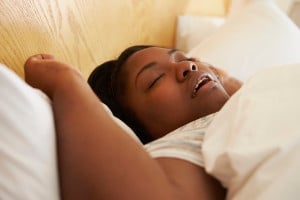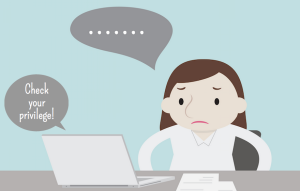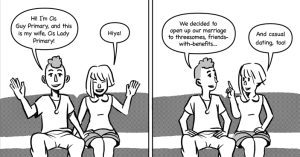Originally published on the Huffington Post and republished here with their permission.

Source: iStock
A couple of years ago, the Pew Research Forum surveyed Americans under 30 years old, asking them questions about abortion and, specifically, Roe v Wade. The survey revealed the following:
- 41 percent thought Roe v Wade involved the death penalty or the environment, or they could not name the subject matter.
- 16 percent thought Roe v Wade was a case about school desegregation.
- 68 percent of respondents who identified as Republicans knew what Roe was about, versus 57 percent of Democrats,
- For the 74 percent who wanted to see Roe overturned, abortion was a “crucial issue” or “one of many crucial issues,” but among those who support a woman’s right to choose, that number was 31 percent.
- 62 percent of Americans ages 18-29, people who for the most part don’t yet have children, said the right to abortion is “not that important” (compared to 53 percent of adults overall).
This week marks the 43rd year since the passage of Roe v Wade which, in legalizing abortion, extended several previously withheld constitutional rights, having to do with privacy, autonomy and due process, to women. It took time and involved endless constitutional interpretations.
In theory, our bodies, we get to decide what happens in and to them. In practice, not so much.
The right to abortion, like other “women’s issues,” remains one that is constantly under attack and considered negotiable.
In 1912, maybe in between the jail time she served for providing sex ed and control to women, Margaret Sanger wrote an article about birth control called “Things That Every Girl Should Know.” Almost 100 years later, echoing Sanger, Gail Collins updated it, penning her own “Things That Every Girls Should Know” about Sanger and the transformative impact of safe birth control.
The problem is, given the political reality of our lives, and the continued male domination of our governance, boys and men, especially liberal and progressive ones, are the ones who need to do more of the knowing.
Today, men and women are equally likely to say they either support or don’t support women’s rights to safe and legal abortion. However, they are not equally likely to be in positions to do something about that fact.
Roe isn’t an abstraction for women as it is for men who make up more than 80% of Congress, 78 percent of state political executives, 75 percent of state legislators, 84 percent of mayors of the top 100 cities, 64 percent of newsroom staffers, 87 percent of police departments and 68% of US Circuit Court Judges.
In the US, these men are overwhelmingly white and they continue to make paternalistic, ill-informed, epistemologically distorted decisions on behalf of women, especially lower status, less privileged, poor women of color.
Even our news coverage denies women anywhere near parity in story telling about abortion and women’s reproduction. A study released yesterday by the Women’s Media Center found that during 2014-2015, in the nation’s top 12 newspaper outlets, “male journalists wrote 52 percent of the articles focused on reproductive issues,” and that “41 percent of all quotes in these pieces were attributed to men.”
Other studies confirm these demographics and the abortion stigma that they produce. One, conducted in 2012, found that in election stories about birth control, 75 percent of quotes came from men, 67 percent in stories that named Planned Parenthood.
Even more appalling, something that should be an affront to anyone who cares about women, a study of nightly news broadcasts between 2010-2014 found that Catholic Church leaders were used as a source on stories about women’s reproductive health care at a rate of six times that of OB/GYNs.
This is criminal. Public understanding, and the ability to shape political life and social norms in a way that reflects women’s experiences, bodies and needs, is degraded by decisions that result in this pervasive marginalization. How any of these corporate bodies can claim moral authority, different from legal or political authority, is gobsmacking.
Time and time again women are paying for the fact that legislators and voters don’t know that 60 percent of women seeking abortions are already mothers, that they rarely feel guilt, and, indeed, express relief and happiness; that abortion is one of the safest of modern medical procedures; or that Catholic hospitals, growing in number, are endanger the lives of pregnant women.
Denying women safe and legal access to abortion is a human rights violation, even in the United States which likes to pretend that human rights violations only happen in other countries.
The legal right to abortion, however, is treated like some kind of perk, something to be negotiated, a matter of opinion, subject to the eternal intervention of men.
We thoughtlessly elect careless and ignorant people, many of whom demonstrate that they know virtually nothing about science, physiology, economics or their relationship to women’s rights and lives. Most of them are people for whom control of reproduction can be reduced to a 12,000-year old, $.50 micro-thin shealth.
How, it seems reasonable as many men suggest, could the problem of reproduction be so critical to women’s entire lives? How could anyone think that things as banal as birth control and safe abortion be considered “Very Important Transformative Technologies,” globally?
Our laws and “morality” continue to reflect, or seek to reproduce, a reality in which reproduction takes place and is managed outside of a body, the way reproduction is experienced by men. For women, the experience cannot be separated, yet, from our bodies. That fetuses are not part of men’s bodies doesn’t make them less part of women’s.
That’s the bitterest pill, the one no one wants to swallow because of all its implications.
Boys and men never have to talk about their “reproductive rights” because the norm, plain old “rights,” is male. “Rights” are only qualified by “reproductive” when we’re talking about women — because what we have is thought of as “different,” and requires “fixing,” as opposed to normative to what it means to be human.
This is evident, materially, for example, in the way that abortion and health as they pertains to women’s reproductive organs are isolated in “clinics” outside of “regular” care and in specialized practices that are considered “extra” and somehow mysterious.
What every boy and man should know is that the rights of the women they know, who look like they are functioning as equals in schools and work, have never been as inalienable and fundamental as their own.
A woman’s right to abortion, to decide if and when and how, to reproduce is a fundamental human right specific to being a human female.
Roe is meant to protect this right for American women. It confirms our right to life, privacy, health, physical integrity and security. It respects women’s freedom of thought, freedom of and from religion. It confirms our rights not to be subject to inhumane and degrading treatment, such as coerced or compelled pregnancy.
Denying women safe and legal abortion the way states are today — whether by law or by regulating access out of practical existence — is the perpetuation of widespread human rights violations in the United States. Every year since 2011 has hit new records of legislative attempts (and successes) to erode or eliminate Roe.
States are closing clinics, regulating doctors out of practice, taking away insurance health benefits, and barring the use of modern, medically safe chemical abortion, forcing patients to be subjected to outdated medical, riskier procedures.
They have made it almost impossible in state after state for girls and women to access their rights safely. It’s happening despite seven in ten Americans support a woman’s right to choose.
As beleaguered as it is, Roe still means we are far, far less likely to die, or be mutilated or suffer from infections. It means no one can legally, if not practically, “let us” die if we desperately want to live.
It means doctors can save our lives if we have ectopic pregnancies or cancer. It means we don’t have to be tied for life to abusive, violent spouses. Or to men who deliberately sabotage our birth control.
It means we should be able to use modern medicine and procedures to intervene, to end miscarriages safely and quickly, even though that’s not happening. It means that we should no longer be forced to carry rape pregnancies against our wills even when our rapists want us to.
It means we shouldn’t have to think about facing imprisonment and impoverishment for something all women, by virtue of having female bodies, must seriously think about during roughly 30 years of fertility.
Every boy and man should know that the right to make decisions regarding our own bodies, to manage our own reproduction, has practical impacts that many people, in the everyday way of sexism, like to write off as selfish, unnatural and not “maternal.”
We get to participate in the world more equally. Go to school. Get and keep jobs. Run for office. Have sex without “ruination.” Take care of our families. Trust that the children we have will be loved, safe and well. Roe is not sufficient in terms of Reproductive Justice, but it is a necessary prerequisite.
The only way you can justify a position in which a woman does not make her own reproductive decisions is if you believe she is not ethically and morally capable, as a function of her gender, and, in the U.S., race. It means you do not trust her to be a fully adult, fully human, being.
Roe was originally based on “four constitutional pillars“ of which only two remain today. Opponents to women’s rights are using laws never intended to apply to abortion to intimidate, investigate, arrest, prosecute and imprison women. They do this in denial of medical facts, scientific research and with no virtually no regard or recognition of the complicated, often dangerous, urgent contexts that are unique to every pregnancy.
In December last year, a 31-year-old Tennessee woman was charged with attempted first-degree murder after she tried to self-abort, at 24-weeks, in her bathtub. Last Spring, Purvi Patel, a 33-year-old Indiana woman was sentenced to 20 years in prison after she was charged with both feticide and felony child neglect.
They join a long list of women, mainly poorer, darker women who pay the highest price for attacks on Planned Parenthood and women’s health.
Today, advocates fear that as clinics are shut down and laws make access difficult, risky self-abortions will grow.
Last year, the Texas Policy Evaluation Project, found that between 100,000 and 240,000 women, ages of 18 and 49, have already tried ending pregnancies by themselves. The most reported method was the use of Misoprostol, but others, such as “herbs or homeopathic remedies, getting hit or punched in the abdomen, using alcohol or illicit drugs, or taking hormonal pills,” were also cited.
It pays to explain why, to quote a Twitter friend, Roe V. Wade, is not “two ways to cross a river.”
It doesn’t inspire confidence that the younger a survey respondent was, the less important they thought a woman’s right to an abortion was. It is particularly worrisome though that liberals, men and women, were the least well informed or committed.
There are good reasons why NARAL, Human Rights Campaign, and Planned Parenthood endorsed Hillary Clinton and Bernie Sander’s dismissal of these organizations as members of the “establishment” is either a deeply cynical or deeply ignorant appeal, either way, it trades on people’s, especially progressive men’s, lack of information, understanding and education.
[do_widget id=’text-101′]
Soraya Chemaly writes about gender, sexual violence, free speech and the role that gender plays in media, politics, religion and education. Her work appears in TIME, The Guardian, Salon and Role Reboot among other media. She is the Director of the Women’s Media Center Speech Project. Follow her on Twitter at @schemaly.
Search our 3000+ articles!
Read our articles about:
Our online racial justice training
Used by hundreds of universities, non-profits, and businesses.
Click to learn more
Most Read Articles
- « Previous
- 1
- …
- 30
- 31
- 32



















